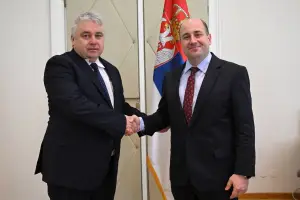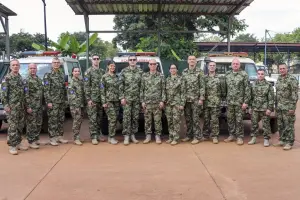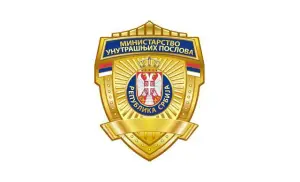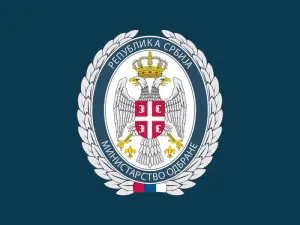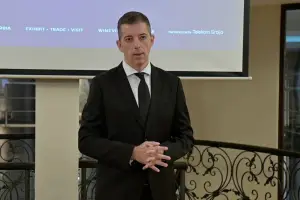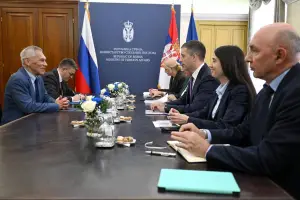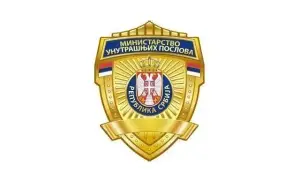Q:
A:
National council to give ICTY cooperation report to UN Security Council
Belgrade,
27 May 2008
The National Council for Cooperation with the International Criminal Tribunal for the Former Yugoslavia (ICTY) decided today to submit a Report on Serbia’s cooperation with ICTY to representatives of the member states of the UN Security Council.
Since the ICTY Prosecutor’s Office submitted a regular report on its cooperation with the former Yugoslav republics, which will be examined on June 4 at the UN Security Council session, the National Council believes that it would be appropriate to submit its report on Serbia’s cooperation with ICTY to Security Council member states.
According to this report, the position of the Republic of Serbia is that its cooperation with ICTY might be described as constructive and successful since out of 46 indictees, whose handover the ICTY requested from Serbia, 42 indictees have been delivered to the tribunal.
Among them, there are two former presidents of the Republic, an ex prime minister, three former chiefs of the Yugoslav Army general staff, former head of the State Security Service, and a large number of military and police generals.
The remaining four indictees who are still at large are constantly being sought by proper authorities, and the best example of that is the attempted arrest of indictee Stojan Zupljanin in Nis on March 26 this year.
Also, high pecuniary awards have been offered for those who have information that could help the arrest of the remaining indictees.
Out of a total of 1,671 assistance requests which the ICTY Prosecutor’s Office submitted to Serbia until the middle of May 2008, referring to submission of documentation and releasing witnesses from the obligation of keeping official secrets, over 95% of requests were fully met, while most of the remaining ones were partially met.
Also, according to terms and conditions defined in the Agreement on insight into the archives of state organs of the Republic of Serbia, representatives of the ICTY Prosecutor’s Office made 20 visits to archives of the organs of the Republic of Serbia from March 2006 until today, including the archives of the Ministry of Defence, the Security and Intelligence Agency and the Ministry of Interior.
All witnesses, for whom the Prosecutor’s Office demanded release from the obligation to keep official secrets, in order to testify before the Tribunal, were released, and the Prosecutor’s Office submitted over 400 such requests.
Furthermore, Serbia has acted on all the Tribunal’s requests and delivered court summonses and other letters to persons on its territory.
Bearing in mind that the media said that the ICTY Chief Prosecutor stated in his report that Serbia’s cooperation in terms of witness protection is unsatisfactory, particularly the protection of witnesses in the case against Vojislav Seselj, it is important to stress that Serbia’s relevant state organs provided protection to all witnesses in all cases demanded by the Tribunal.
The only exception is the case where after consulting the witness for whom protection had been demanded, and after conducting thorough security checks, it was assessed that it is not necessary to provide protection, of which the Tribunal was duly informed.
As proof of Serbia’s commitment to bringing as many as possible of those responsible for was crimes before the court, the National Council stressed that so far 123 cases of persons accused of severe violation of international humanitarian law have been processed by Belgrade District Court’s War Crimes Chamber
The War Crimes Chamber in Belgrade and the Serbian War Crimes Prosecutor’s Office have shown professional and technical abilities to process abovementioned cases in line with international standards.
The ICTY Prosecutor’s Office also demonstrated such a stance in the case of Kovacevic, which the Tribunal handed over to the Serbian judiciary, as well as other cases, adds the statement.
According to this report, the position of the Republic of Serbia is that its cooperation with ICTY might be described as constructive and successful since out of 46 indictees, whose handover the ICTY requested from Serbia, 42 indictees have been delivered to the tribunal.
Among them, there are two former presidents of the Republic, an ex prime minister, three former chiefs of the Yugoslav Army general staff, former head of the State Security Service, and a large number of military and police generals.
The remaining four indictees who are still at large are constantly being sought by proper authorities, and the best example of that is the attempted arrest of indictee Stojan Zupljanin in Nis on March 26 this year.
Also, high pecuniary awards have been offered for those who have information that could help the arrest of the remaining indictees.
Out of a total of 1,671 assistance requests which the ICTY Prosecutor’s Office submitted to Serbia until the middle of May 2008, referring to submission of documentation and releasing witnesses from the obligation of keeping official secrets, over 95% of requests were fully met, while most of the remaining ones were partially met.
Also, according to terms and conditions defined in the Agreement on insight into the archives of state organs of the Republic of Serbia, representatives of the ICTY Prosecutor’s Office made 20 visits to archives of the organs of the Republic of Serbia from March 2006 until today, including the archives of the Ministry of Defence, the Security and Intelligence Agency and the Ministry of Interior.
All witnesses, for whom the Prosecutor’s Office demanded release from the obligation to keep official secrets, in order to testify before the Tribunal, were released, and the Prosecutor’s Office submitted over 400 such requests.
Furthermore, Serbia has acted on all the Tribunal’s requests and delivered court summonses and other letters to persons on its territory.
Bearing in mind that the media said that the ICTY Chief Prosecutor stated in his report that Serbia’s cooperation in terms of witness protection is unsatisfactory, particularly the protection of witnesses in the case against Vojislav Seselj, it is important to stress that Serbia’s relevant state organs provided protection to all witnesses in all cases demanded by the Tribunal.
The only exception is the case where after consulting the witness for whom protection had been demanded, and after conducting thorough security checks, it was assessed that it is not necessary to provide protection, of which the Tribunal was duly informed.
As proof of Serbia’s commitment to bringing as many as possible of those responsible for was crimes before the court, the National Council stressed that so far 123 cases of persons accused of severe violation of international humanitarian law have been processed by Belgrade District Court’s War Crimes Chamber
The War Crimes Chamber in Belgrade and the Serbian War Crimes Prosecutor’s Office have shown professional and technical abilities to process abovementioned cases in line with international standards.
The ICTY Prosecutor’s Office also demonstrated such a stance in the case of Kovacevic, which the Tribunal handed over to the Serbian judiciary, as well as other cases, adds the statement.




